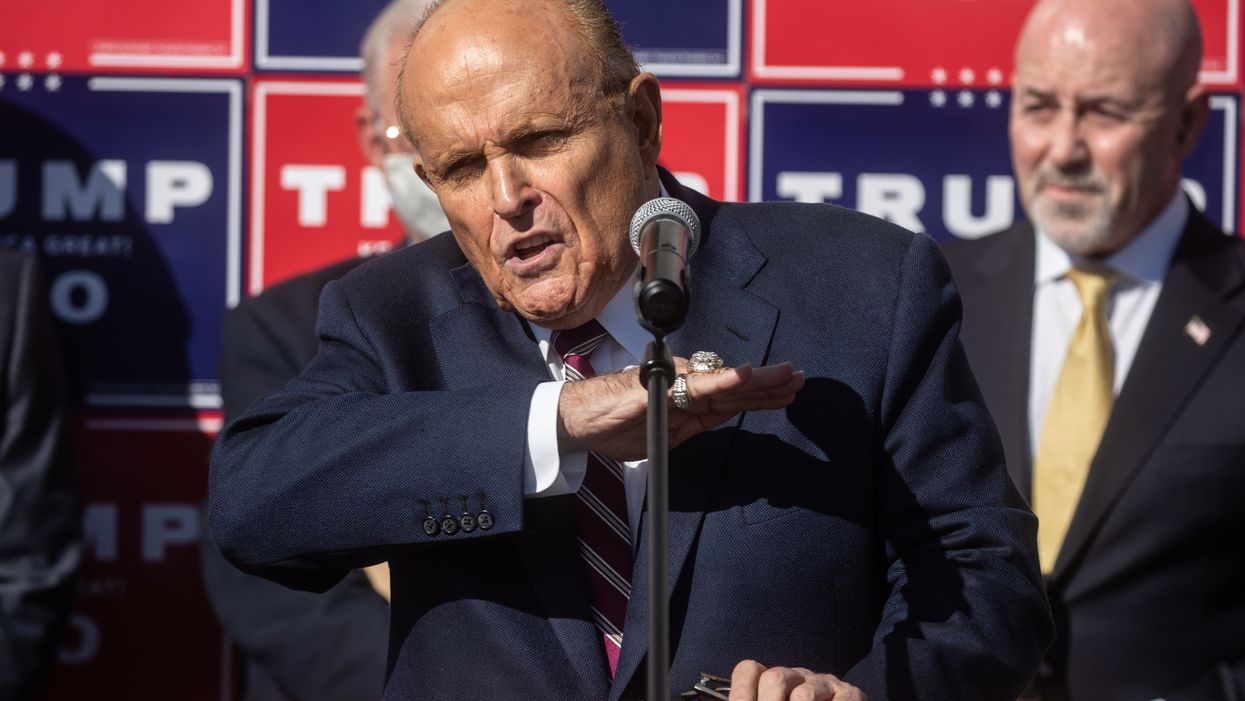The most ambitious of President Trump's longshot and counterfactual claims against the election is getting its day in federal court Tuesday.
The hearing in Pennsylvania comes two weeks after the nation voted decisively to deny Trump a second term, which in public he steadfastly refuses to realize — while almost all Republicans in authority continue to enable the fiction. The consequence is that the bedrock of American democracy, which by all accounts was remarkably fair and efficient despite a deadly pandemic, has been sullied as never before by a presidential disinformation campaign.
Underscoring that, 59 top election security experts and computer scientists have rebuked Trump for his baseless assertions about voting fraud and cheating by election hackers, saying "these claims either have been unsubstantiated or are technically incoherent."
"Anyone asserting that a U.S. election was 'rigged' is making an extraordinary claim, one that must be supported by persuasive and verifiable evidence," the group wrote in a statement they are posting on their websites. "To our collective knowledge, no credible evidence has been put forth that supports a conclusion that the 2020 election outcome in any state has been altered through technical compromise."
That blunt pushback was delivered at the same time President-elect Joe Biden amped up his own impatience with Trump's refusal to accept the outcome. Presumably, once Trump does admit his loss, the outgoing government could begin cooperating with the incoming administration.
"More people may die" of the coronavirus, Biden warned Monday, unless his team and Trump's team can begin coordinating now on pandemic policy — especially to allow the earliest possible start of Covid-19 vaccinations after the inauguration.
The hearing that began Tuesday afternoon is an effort by Trump's campaign to block Pennsylvania from certifying its final election result. The deadline is Monday, and with less than 2 percent of ballots still in limbo, Biden is ahead by 74,000 votes. The state's 20 electoral votes are no longer crucial to his path toward the presidency, though, because even without them he has 286 electoral votes, 16 more than the number assuring victory.
The president's most high-profile attorney, Rudy Giuliani, has been permitted to represent the Trump campaign before Judge Matthew Brann at the federal courthouse in Williamsport — apparently his first courtroom appearance since he moved from federal prosecutor to mayor of New York nearly three decades ago
During an interview Tuesday on Fox Business, Giuliani claimed without offering any further explanation that his argument hinges on 700,000 ballots that "were counted surreptitiously," adding: "Frankly, that is a case that we would like to see get to the Supreme Court."
The Pennsylvania claim, which hinges on the fact that tabulating rules were not uniform statewide, is among more than a dozen lawsuits filed by the Trump campaign and Republican voters hoping to slow or prevent the certification of election results — mainly in battleground states that Trump lost narrowly.
Suits brought by his GOP allies in Wisconsin, Michigan and Georgia were abandoned on Monday, joining a roster of more than a dozen claims that have been dismissed by various state and federal courts. And a Michigan appeals court on Monday denied another bid to stop the certification of Detroit-area votes.
But the president's team is still fighting the steeply uphill cause of getting the results in those and other states upended with more litigation yet to be filed — or with recounts. While Georgia is conducting its own recanvass that has shifted votes minimally, Trump would have to foot an $8 million bill for a do-over tally in Wisconsin. He lost both states by less than 1 point but at least 14,000 votes.
The election experts' letter followed a similarly strong rebuttal of the president's claims last week by a panel of experts convened by Trump's own Department of Homeland, who declared the 2020 election "the most secure in American history"because "there is no evidence" any voting systems were compromised.
For the four years since Russians made virgous attempt to hack the previous election, election integrity experts and good-governance advocates have been promoting an array of measures to make voting more secure, transparent and trustworthy — but legislation embodying these ideas has been spurned by Senate Majority Leader Mitch McConnell on the grounds that the ideas were partisan and unnecessary. McConnell, of course, is now the most powerful Republican allowing Trump to go unchallenged in his baseless complaints that he's being robbed of a second term by weak election security.
Another, even higher-volume Republican proponent of the president's fraud claims in recent days has been Trey Trainor, the chairman of the Federal Election Commission since his confirmation this summer. While his agency would be in charge of deciding whether money spent on election controversies was in line with federal campaign finance law, Trainor has felt unbound by any complaints about conflicts of interest.
Trainor has declared his view that many reports of voter fraud in battleground states are credible and that Democratic officials have broken federal law by making life difficult for GOP poll watchers. And on Monday he tweeted his endorsement of one of the Trump team's attorneys, fellow Texan Sidney Powell, saying he's never known her "to be anything but forthright and honest in every case she's ever taken on. If she says there is rampant voter fraud in #Election2020, I believe her."




















